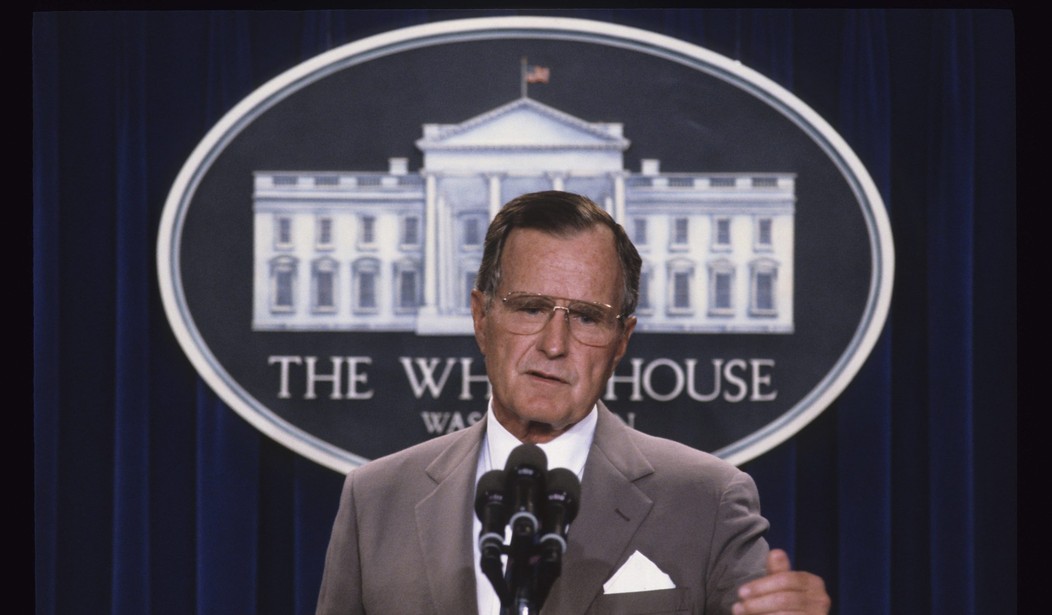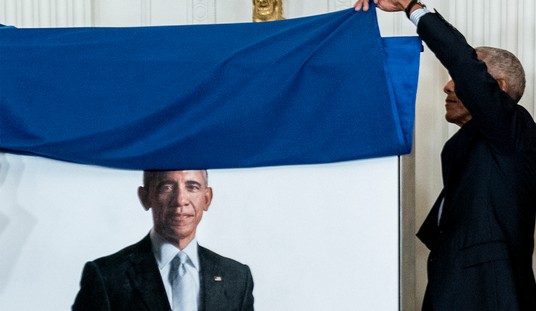I was going to wait a few days after the obsequies — a “decent interval,” as they say — before writing something critical about George H.W. Bush, and in fact about the Bushes generally, but Michael Walsh beat me to it with a terrific piece that was posted at American Greatness on December 6. I can understand Walsh’s impatience to correct the record on 41; in the days after Bush’s death, and climaxing with the eulogies at his funerals in Washington and Houston, I heard assertions about Bush’s White House record that could hardly have been more at odds with my own memories of his hapless administration.
Speaking from the pulpit of the National Cathedral, Jon Meacham, GHWB’s authorized biographer, came off like the groveling courtier that he is, calling Bush “America’s last great soldier-statesman” (the prologue of his Bush biography is entitled “The Last Gentleman”), a “master of … the science of human relationships,” “our shield in danger’s hour,” and much else. On Bush’s watch, declared Meacham, “a wall fell in Berlin,” a slippery formulation that might make you think that it was George Bush, and not Ronald Reagan, who stood before a cheering crowd at the Brandenburg Gate and called on Gorbachev to tear down the Wall.
Those of us who paid attention at the time know that it was Reagan who unsettled even his advisors with his insistence that, rather than contain or manage our relations with Moscow, it was a moral imperative to do and say everything possible, short of outright war, to try to bring down the Iron Curtain. Bush, for his part, was not a moralist but a manager, not a bully-pulpit type but a dyed-in-the-wool bureaucrat, who, as Walsh puts it, “prized ‘stability’ over everything else and did all he could to maintain the status quo” and who, as a result, “egregiously mishandled the Gipper’s most important legacy: the defeat of the Soviet Union and the end of the Cold War.”
Meacham, in his eulogy, admitted that Bush was a tongue-tied mushmouth, but treated this as a charming eccentricity instead of recognizing that the trouble Bush had putting a cogent sentence together had more than a little to do with the fact that he didn’t really have anything much to convey. He was the guy with the ultimate perfect CV — Yale grad, head of the CIA, ambassador to China, House member, vice president — but with no core convictions. To read the texts of Reagan’s radio addresses, written by Ron himself in the years before his presidency and collected in the book Reagan in His Own Words, is to encounter a deeply thoughtful man of rock-solid convictions. Bush, by contrast, was the paper-pushing bureaucrat who, while preparing for his 1988 presidential run, spoke dismissively about what he called “the vision thing” — namely, the need to actually stand for something and be able to communicate it effectively to the electorate.
Meacham asserted that Bush was “a loving man with a big, vibrant, all-enveloping heart … a lion who not only led us, but who loved us.” Give me a break. Longtime crony James Baker, in his own salute at the memorial service in Houston, contributed more superlatives: calling Bush “a man of great faith and great integrity, a truly beautiful human being” (Jerry Lewis introducing Sammy Davis, Jr.?), Baker praised “his decency, his boundless kindness and consideration of others, his determination always to do the right thing,” his “life nobly lived.”
Two words: Lee Atwater.
Yes, politics is by its nature a dirty business. But Bush’s 1988 presidential campaign was especially dirty, because that great gentleman, that lion who loved us, that man of boundless integrity, was in fact a wily patrician who preferred to keep his hands clean but who put his political operation in the hands of the slimiest thug he could find, a creep for whom no tactic was too low-down. On Bush’s behalf, Atwater race-baited and gay-baited to an unprecedented, repulsive degree. After Atwater became head of the RNC, he released an attack memo about a couple of high-level Democrats that was so slimy, so below-the-belt, that even Bob Dole, despite his close friendship with Bush and his intense loyalty to his party, felt compelled to condemn it from the Senate floor as “garbage.”
Since Bush’s death, of course, everybody and his brother has been contrasting that “gentleman” politician with our supposedly crude and loutish current commander-in-chief. Frankly, however, I have a hell of a lot more respect for a president who speaks his mind candidly about his opponents than for one who plays the high-minded aristocrat while hiring a veritable hit man to spread lies about them.
But the main problem with Bush was his failure to respond to the fall of Communism in Europe with strength and imagination. As Walsh puts it, “instead of swooping in with an initiative that would have made the Marshall Plan look niggardly by comparison,” Bush and company left Russia and Eastern Europe “to the tender ministrations of capitalistic ‘advisors’ such as George Soros who, like Tammany’s George Washington Plunkitt, ‘seen his opportunities and took ’em.’”
But then, adds Walsh, quite correctly, “[m]issing opportunities is the story of the Bush family — George W. Bush certainly missed his after 9/11.” You can say that again. Even as the Twin Towers were still smoldering, and Americans were still united in shock and rage, GWB, just for starters, could’ve sent cops or soldiers into every mosque in the country, closed every single one of them that contained so much as a page of jihadist propaganda, deported en masse anyone known to have preached or cheered on jihad, and, in a series of speeches, led a nationwide crash course in the danger and duplicity of the Islamic enemy.
If he’d done that, no president after him could have undone it. Indeed, if he’d focused on protecting the U.S. from Islam rather than on toppling Saddam, we’d probably have been spared Obama entirely. Indeed, it scarcely seems an exaggeration to say that it was the mediocrity of GHWB that gave us Clinton, and it was the mediocrity of GWB that saddled us with Obama. No, while every death (well, almost every death) should be mourned, and while it is fitting and proper to show respect for the office of president, and while it is only human nature to be moved by the spectacle of people remembering their recently deceased loved ones, the Bush dynasty is, to put it bluntly, nothing to celebrate.









Join the conversation as a VIP Member